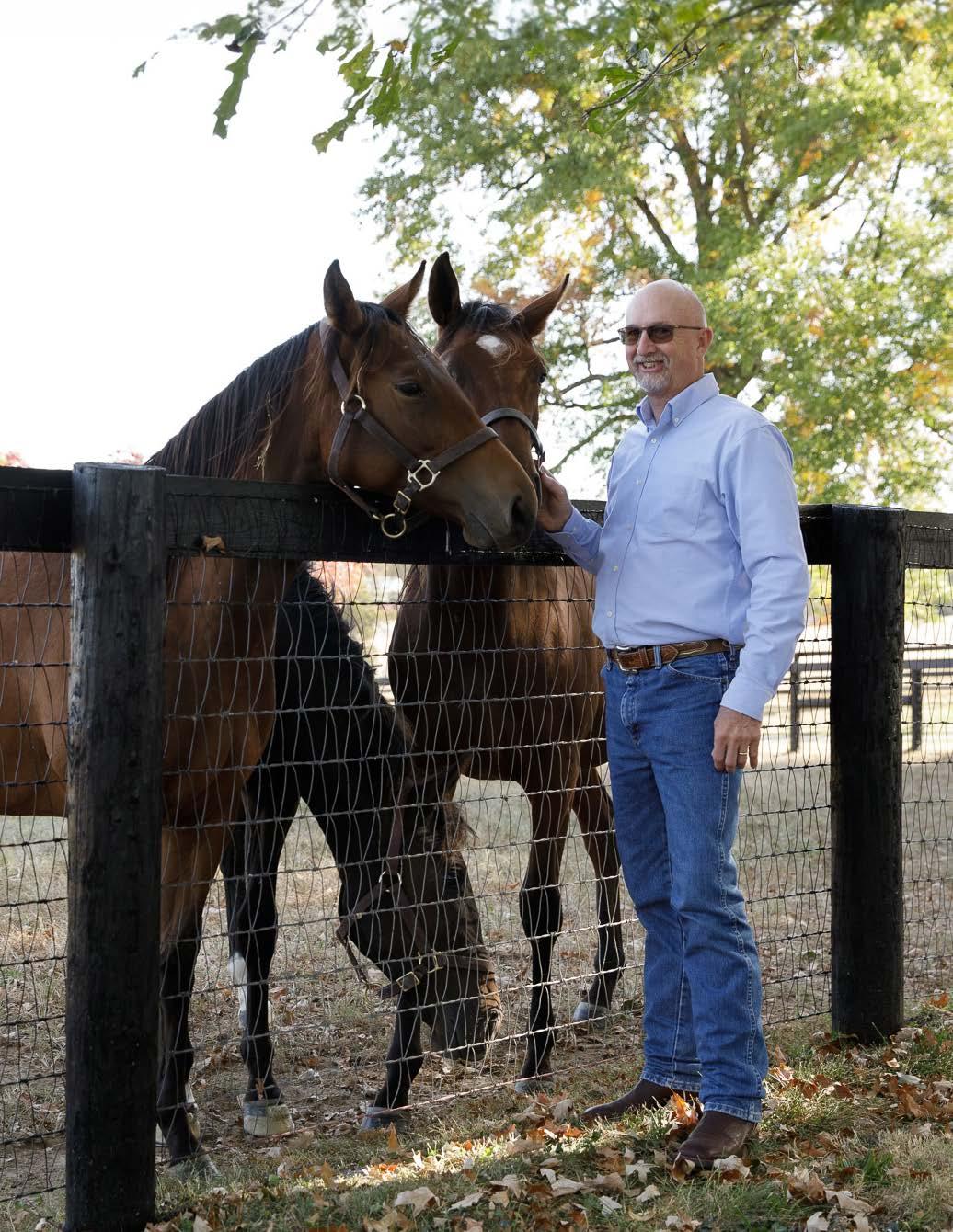




Vaccination and therapeutic strategies help protect horses from rabies, EPM and other seasonal threats.
As an equine veterinarian, keeping your patients healthy and safe from preventable diseases is always a priority. With the risk of fall diseases like rabies and equine protozoal myeloencephalitis (EPM) still present, now is the perfect time to review your vaccination and treatment protocols. Plus, with the spring vaccination season just around the corner, make sure you’re stocked up on products like PRESTIGE® EquiRab® and the full PRESTIGE® vaccine line, as well as PROTAZIL® (1.56% diclazuril) Antiprotozoal Pellets, to ensure your patients are protected year-round.
Rabies vaccination: A critical preventive measure
As you know, rabies is a serious, fatal zoonotic disease that remains a threat to horses through wildlife exposure. Your role as a veterinarian in keeping both horses and humans safe by making sure rabies vaccinations are up-to-date can’t
be overstated. PRESTIGE EquiRab, the first rabies vaccine developed for horses, has a long track record of safe and effective protection.
The AAEP recommends vaccinating all horses annually for rabies, regardless of their circumstances, so stay vigilant and keep PRESTIGE EquiRab in your arsenal. Because horses can

encounter rabies risks year-round, remind your clients of the importance of staying current on vaccinations. This is also a great time to stock up on PRESTIGE® EquiRab® as you prepare for spring.
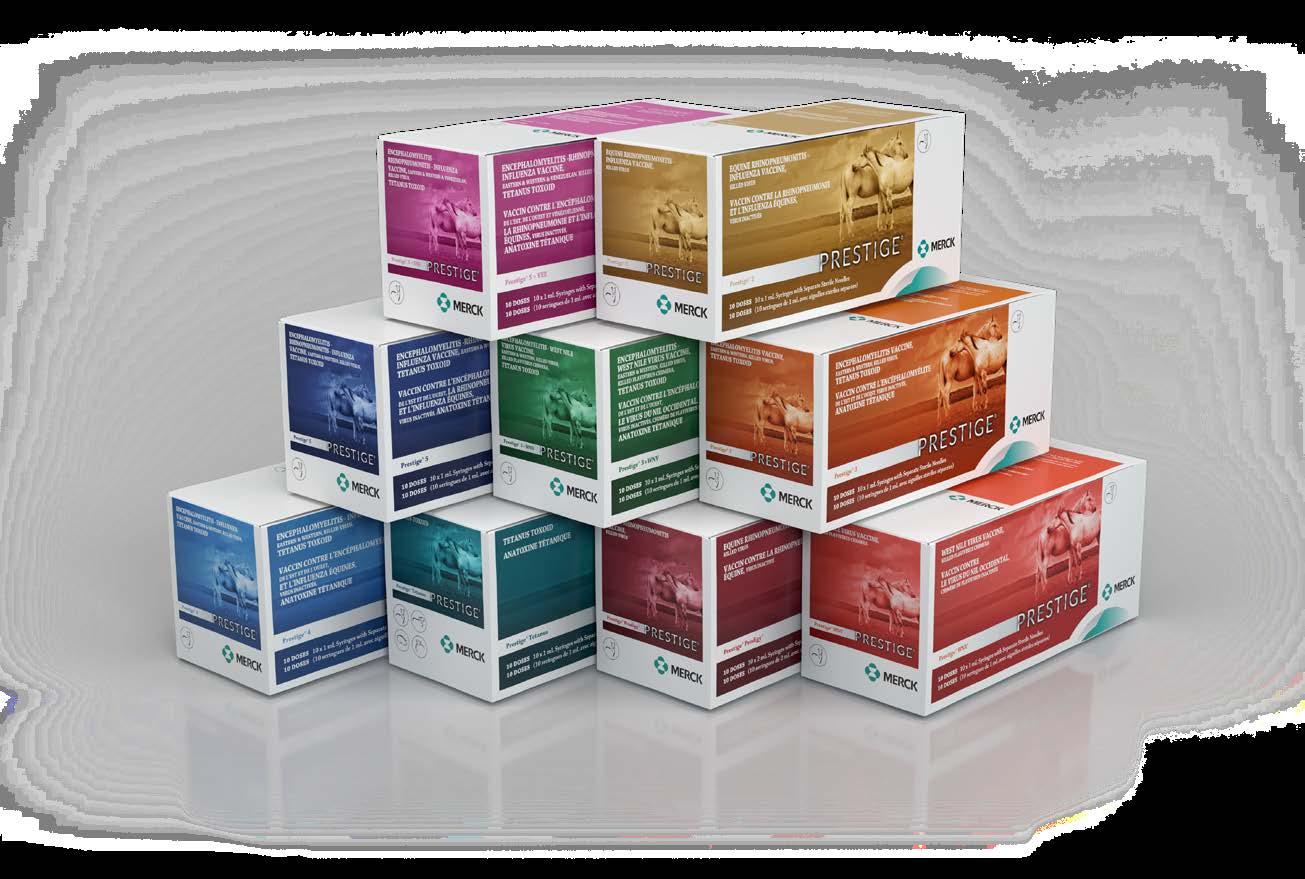

Create your knockout combination with PRESTIGE®
Starting with PRESTIGE EquiRab provides a solid foundation for any equine vaccination plan, giving you the flexibility to build a customized and comprehensive approach. The PRESTIGE line offers maximum versatility, allowing you to deliver a powerful one-two punch against rabies and other serious diseases.
You can count on the PRESTIGE family of vaccines for protection against key threats like equine influenza, equine herpesvirus types 1 and 4, West Nile virus and more. With options for both combination and single-antigen vaccines, PRESTIGE equips you to streamline protocols and tailor vaccination plans to meet the specific needs of your clients and their horses—with no compromise.
Spring is approaching, and now is the ideal time to check your inventory and ensure you have the vaccines you need on hand. By planning ahead, you can help reduce the risk of disease outbreaks and make sure your patients are protected from the most common and serious health threats.
EPM with PROTAZIL® (1.56% diclazuril) Antiprotozoal Pellets
EPM is another challenge, especially with wildlife activity increasing in fall. Early diagnosis and treatment are essential to improving outcomes for horses diagnosed with this debilitating—and frightening—disease. PROTAZIL from
Merck Animal Health is an effective treatment that can help you combat EPM and prevent further neurological damage.
The ease of administering PROTAZIL combined with its proven effectiveness makes it a go-to solution for EPM cases. Having PROTAZIL on hand as part of your EPM treatment protocol ensures that your patients can receive timely and effective care when they need it most. Stocking up now is a smart move as you prepare for an increase in cases with the change of season.
As 2024 winds down and you look to the next season, being prepared helps you maintain the health and well-being of the horses you care for. Take steps now to review your protocols and stock up on PRESTIGE vaccines, PROTAZIL and the rest of our trusted line of pharmaceuticals so you can ensure your patients are well-protected throughout the year, no matter what challenges come their way—or yours.
Take advantage of special savings on these and other products from Merck Animal Health. Contact your sales representative today for more information on our 2024 AAEP program.
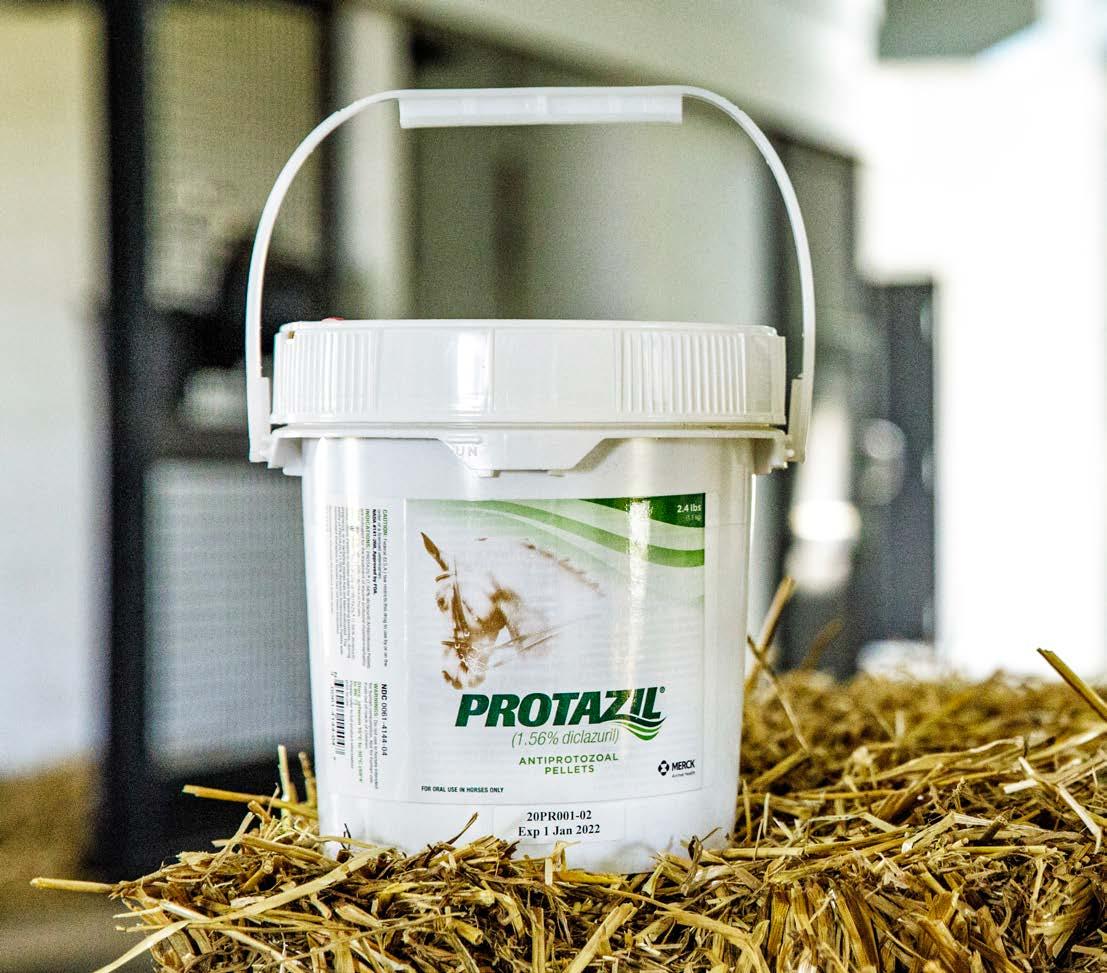
IMPORTANT SAFETY INFORMATION: PROTAZIL® is contraindicated in horses with known hypersensitivity to diclazuril. The safety of Protazil in horses used for breeding purposes, during pregnancy, or in lactating mares, and use with concomitant therapies in horses has not been evaluated. Do not use in horses intended for human consumption. Not for human use. For complete safety information, refer to the product label. See full prescribing information
On September 28, World Rabies Day, Merck Animal Health kicked off its “Knockout Rabies” campaign to draw the attention of horse owners and veterinarians to the critical need for rabies vaccination. The risk of rabies is often overlooked, and vaccination is a simple, economical and effective defense. Yet every year horses die from this preventable disease and humans are unnecessarily exposed.
The equine team at Merck Animal Health would like nothing more than to truly “knock out” rabies from the horse population. You can join the effort by sharing these facts and tips with horse owners.
Arm clients with knowledge to help knock out rabies:
• Rabies is one of the deadliest viral diseases, with an almost 100% fatality rate once symptoms appear. Yet it remains 100% preventable through vaccination.
• Rabies is zoonotic, meaning it can be passed from animals to people. Vaccinating horses protects you as well as your horse.
• Each year over 59,000 people worldwide lose their lives to rabies, with 29 million more requiring lifesaving treatment.1
• The American Association of Equine Practitioners (AAEP) recommends rabies vaccination for every horse, every year.
• Rabies cases in horses increase in late summer and early fall, likely due to increased interaction between horses and wildlife such as bats, raccoons, skunks and foxes, which are more active during these times.
• Since wildlife may enter barns (especially at night), both stalled horses and horses on pasture have the potential to be exposed.
• Not sure your horse is protected? Talk to your veterinarian today about PRESTIGE® EquiRab®, the first rabies vaccine developed specifically for horses.
For more information about the “Knockout Rabies” campaign and Merck Animal Health’s ongoing efforts in rabies prevention, view this helpful fact sheet. Together, we can knock out rabies and keep our equine companions safe.
Orlando, FL | December 7-11, 2024
Orange County Convention Center

Attend these events for a sampling of how Merck Animal Health supports the equine profession.
As part of its Unconditional commitment to horses and the people who care for them, Merck Animal Health is sponsoring and hosting a number of events at the upcoming 2024 AAEP Convention in Orlando. Here’s a rundown—please plan to attend one or more and say hi! We love to hear from our customers.
• Exhibit Hall. Stop by booth no. 1167 during exhibit hall hours.
• Keynote Address. Reverend and equine DVM Rick Lesser presents “Live Your Whole Life.”
• Kester News Hour. In honor of the late Dr. Wayne O. Kester, the Kester News Hour highlights the latest scientific papers in specific areas of equine medicine.
• Student Career Panel. This panel discussion offers tips and advice from a panel of equine practitioners on making the most of an internship year.
• Internship/Externship Night. Hundreds of capable students network with equine practice representatives looking for young talent to strengthen their pipelines.
• Early Career Practitioners’ Reception. Build connections and harness the power of social relationships among peers in their first five years of practice.
• Vet Story Night. Enjoy an evening of engaging storytelling, music and laughs with your veterinary colleagues and special guests.
• Educational Sessions. Dive into business, practice life, infectious disease and well-being topics as part of the educational program.
Access the full AAEP schedule here
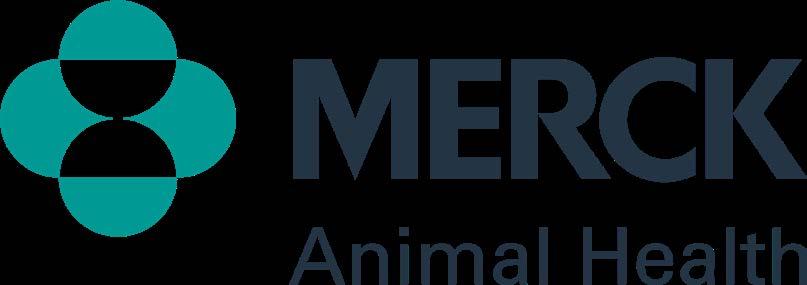
Merck Animal Health is committed to helping build the future of the veterinary profession by providing technician student scholarships in partnership with the American Veterinary Medical Foundation (AVMF). The Merck Animal Health/AVMF Veterinary Technician Student Scholarship offers $2,000 scholarships to students at AVMA-accredited veterinary technician schools in the U.S. and Puerto Rico.
Over the years, the partnership has granted scholarships to nearly 400 students, many of whom have become influential leaders in the veterinary field. The award is “an example to the up-and-coming veterinary technicians that they are valued, and their hard work is appreciated,” says scholarship recipient Hayle Robbins.
To be eligible, students must be in good standing and in their final year of school at an AVMA-accredited veterinary technician school. The decision is merit-based, with some consideration for financial need, and diversity is considered in the selection process.
By investing in technician students, Merck Animal Health is helping to build a strong and sustainable workforce for the future.
To learn more and view a list of past recipients, visit AVMF.org.

Dr. Shane Baird has found success through communication, balance and sustainability.
When Shane Baird, DVM, was considering his career choices, one thing was clear: he wasn’t going to spend his days shut up in an office. “Seventy degrees and fluorescent lighting are not my style,” he says.
Instead, his passion for horses—and the joy of working outside—led him to equine medicine. Now, as the owner of Mobile Veterinary Services, an ambulatory practice serving Colorado’s Front Range region, Dr. Baird has built his career around the things he loves most: no two days are ever the same, and he’s never far from the company of a horse.
As his practice has grown, Dr. Baird has worked to cultivate a work environment that values communication, work-life balance and professional growth. His approach provides a blueprint for others looking to create a sustainable, supportive team culture in the demanding field of ambulatory equine care.
The core of Dr. Baird’s practice culture lies in four key values: passion, reliability, integrity and communication. Among these,
communication is the foundation. Whether it’s a veterinarian at a farm visit or a team member answering phones at the office, clear and thorough communication is paramount. “We take the time to make sure clients are comfortable with the decisions being made and all their questions are answered,” Dr. Baird says.
Strong communication is just as important within the team. In a job where each day brings something new, having systems in place that promote consistent messaging and clear processes helps maintain a sense of normalcy. This structure allows the team to adapt to the unpredictability of equine practice while ensuring that both clients and fellow team members remain informed and supported. These systems aren’t rigid, Dr. Baird notes, but rather tools to help the team function smoothly.
Beyond communication, Dr. Baird is committed to a sustainable work environment for his team. The practice operates on a fourday workweek, with on-call duties shared equally among the veterinarians. This approach helps prevent burnout by allowing team members the freedom to explore personal passions outside of work. “Management is adamant that time off is in fact time off, and it’s OK to leave your computer and communication device behind,” he says.
Veterinarians and staff members are also encouraged to seek out continuing education opportunities in areas that inspire them. Allowing his team to find their own passions in practice creates a collegial work environment and inspires continued professional growth, Dr. Baird says.
One of the many challenges of mobile practice is that the team is often scattered in separate locations. Despite this, Dr. Baird makes it a priority to celebrate successes—whether by email, text or handwritten note placed on a desk. Regular all-practice meetings are another opportunity to recognize the team’s contributions. “We’ve added a step to get feedback after new client visits, to ask how things went, and I make sure to pass on any positive feedback,” Dr. Baird says.
This culture of support extends to client relationships as well. Dr. Baird believes that a positive and communicative work environment motivates the team at Mobile Veterinary Services to go the extra mile for clients. He encourages his team to take the time to communicate all diagnostic and treatment options thoroughly, making sure clients feel supported in every step of the process.
Each doctor and staff member is encouraged to handwrite a couple of personal note cards each week to clients, with prompts like “Thank you,” “Congratulations,” or “I was thinking of you.” This small gesture is a powerful way to connect with both new and existing clients. “Taking the time to communicate with clients builds trust and reinforces the relationship,” he says.
This client-focused culture has contributed to the success and growth of the practice, where word-of-mouth referrals are a key driver of new business. As Dr. Baird notes, “It’s a small world, people talk, and that world gets mighty small when you add a horse!”
The success of the practice has, in many ways, been a reflection of its strong internal culture. Dr. Baird encourages open communication and honesty within his team and is committed to developing systems that provide clarity and reduce uncertainty. When challenges inevitably arise, he does not shy away from difficult conversations, ensuring that the team stays aligned on core values and goals.
“Be honest, open and engaging with staff,” Dr. Baird advises. “Develop systems and standard operating procedures (SOPs) to mitigate questions and concerns, but also be willing to have tough conversations when necessary.”
Through this balanced approach built on communication, support, and sustainability, Dr. Baird has created an equine ambulatory practice that meets the demands of horse owners while helping his team thrive. His experience demonstrates how intentional leadership can create a work environment where the team feels supported, clients feel valued and the practice continues to grow through the power of positive relationships.
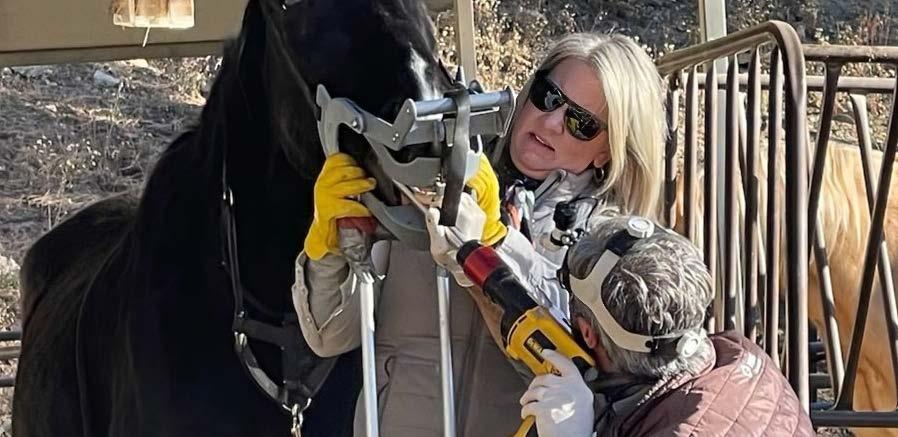
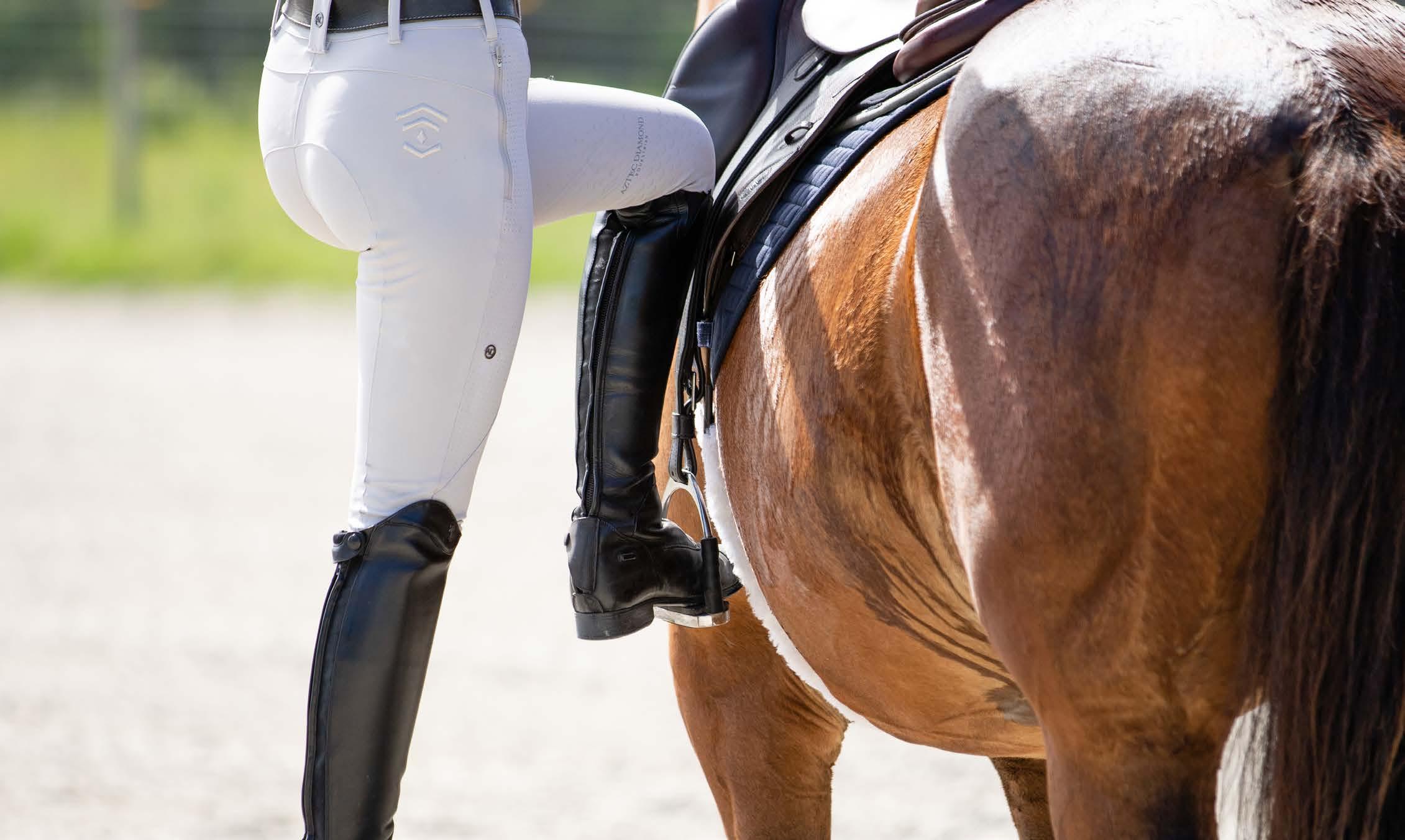
This installment of Ron’s Campfire is an original piece written by Cara Wright, DVM, MS, Merck Animal Health.
Veterinary team members are the backbone of any equine practice, where technicians and other support staff work hard to take care of patients, educate and reassure clients, and keep the practice running smoothly. However, they also face a number of challenges. From communication barriers and underutilization of skills to high stress levels, life on an equine team can be demanding—even lonely.
Recognizing these challenges, Merck Animal Health developed the LegUp Program, an initiative aimed at empowering and supporting veterinary support staff in equine practices. It was launched earlier this year, and the program is already garnering some great reviews from participants. Let’s take a closer look.
The LegUp Program is structured around educational content meetings that are complemented by small group discussion sessions. While participants value the content modules, they’re also enthusiastic about the opportunity to connect with their peers.
Sue Novik, RVT, of Starwood Equine Veterinary Services, says it’s this combined approach that sets the LegUp Program apart. “I can hear about a new skill or viewpoint in a presentation, think about it, and apply it to my work or life,” she says. “Then, I have the opportunity to troubleshoot specific scenarios and hear how things work in other practices from my peers.”
This sense of community is a major draw for many participants. The small-group discussions allow for meaningful conversations, fostering a sense of belonging that can be rare in the sometimes-isolating world of equine practice.
“It was easier to talk about the issues we face in our day-to-day lives within this career and feel like we are not alone in some of the issues we are faced with,” says Morgan Passow, LVT, from Comstock Equine Hospital.
Unlike programs that focus on technical skills, the LegUp Program zeroes in on professional and personal development. While participants learn strategies for improving practice culture and communication skills, they also delve into personal finance and best practices for technician utilization.
“I gained a better understanding of the most important aspects of my personal finances,” says Alexa Forman, a veterinary assistant from Garden State Equine Veterinary Dentistry. “I also acquired an understanding of my role in the profitability of the practice and offered support to those dealing with conflict in the workplace.”
This kind of experience highlights the program’s commitment to helping participants grow as practice leaders and as individuals. The modules encourage participants to reflect on their personal strengths, values and goals, equipping them with tools that benefit both their careers and personal lives.
Equine veterinary support staff often face specific challenges that can hinder their ability to thrive in their chosen career. In a survey conducted by Merck Animal Health, the most commonly cited issues facing equine support staff were communication breakdowns, underutilization of skills and limited opportunities for growth. Recognizing these concerns, LegUp organizers developed the curriculum to provide tools participants can implement in their own practices.
“Technician utilization is a personal concern of mine, and I was introduced to people who truly utilize technicians to the fullest,” says Cayla Chevalier, who is training to become a certified veterinary technician. “I also learned that I am not the only one struggling. It made me feel less alone and able to connect over problem solving.”
Mental health and well-being are also significant concerns for veterinary team members, who often work long hours in stressful conditions. In fact, the most recent Merck Animal Health Wellbeing Study found that mental health is worse for support staff than veterinarians—something the LegUp Program can help address.
The program helps reduce feelings of isolation by cultivating a supportive community. This is particularly important for those working in ambulatory practice, where technicians and assistants may spend long hours on the road or in the field, away from the support of their colleagues.
“I would have never spoken with any of these amazing people if it were not for this program,” Chevalier says. “I gained a knowledge of how other hospitals work and how my fellow technicians and support staff function in these hospitals.”
As the LegUp Program evolves, Merck Animal Health is committed to making the program as beneficial as possible for equine technicians and support staff, with the ultimate goal of enhancing the sustainability and well-being of equine veterinary teams across the country.
For many technicians, the LegUp Program has already made a significant impact—providing not only new knowledge and skills but also a renewed sense of purpose and connection.
“This program is amazing,” says Chevalier. “The ability to connect with people is priceless. Learning how others function and what other hospital dynamics look like has been an eyeopener for me personally.”
The LegUp Program is free for participants, thanks to sponsorship from Merck Animal Health. With virtual meetings held after work hours, the program is designed to fit seamlessly into even the busiest schedules.
“It is a small time commitment to gain information and perspective that can improve many aspects of your life,” says Novik. “I left every meeting with a new idea to implement.”
If you’re interested in participating in the next cohort of the LegUp Program, visit the program website or contact legup@merck.com for more information.

By Cara Wright, DVM, MS, Merck Animal Health
Equine veterinarians face unique challenges when it comes to on-call duty. The unpredictable nature of emergencies and the lack of control over when calls come in can create significant stress—even when no actual emergencies occur. However, by adopting practical strategies, you can manage on-call stress more effectively, protecting your mental and physical well-being. Here are some tips to help you handle the demands of emergency duty.
Managing how you handle calls during on-call shifts can reduce anxiety and give you a sense of control over your time.
• Adjust callback expectations: Extending your callback time from 10 to 20 minutes can give you the flexibility to finish tasks, like taking a shower or running an errand, without feeling rushed.
• Screen calls: Use voicemail to screen calls or hire an answering service to give yourself a few extra moments to mentally prepare before responding.
• Set backup alerts: If you worry about missing calls, establish backup options like text alerts or a landline. Make sure your voicemail instructs clients to call back if they haven’t received a response in a set time.
• Change your ringtone: Choose a calming or fun ringtone to reduce the stress associated with hearing your phone ring.
• Delegate when needed: When attending to critical personal tasks, such as putting kids to bed, ask a team member to cover the phone temporarily.
Preparation is key when handling cases, but you don’t always have this luxury when handling a case on call. This stress can compound when cases feel overwhelming or unfamiliar. Here are a few tactics:
• Prepare for challenging cases: Create a cheat sheet for the types of cases you’re less comfortable with so you can quickly reference these during call duty.
• Know when to refer: Build strong relationships with referral centers and don’t hesitate to call them for guidance. Being able to consult with specialists can ease the pressure.
• Talk it through: Discuss difficult cases with a mentor or trusted colleague on your way to the call. This helps reduce anxiety and ensures you feel more prepared upon arrival.
Research has found that being on call hinders your ability to relax and sleep deeply, even when no calls come in. A few adjustments can help you fully rest and manage the demands of emergency work more effectively.
• Take time off: Schedule a full day off after a weekend of on-call duties to recover both physically and mentally.
• Implement triage autonomy: Work with your practice to establish clear parameters for what constitutes a true emergency, giving the on-call veterinarian the authority to make triage decisions.
• Plan ahead for personal time: Plan activities such as workouts for times when calls are less likely, like early mornings.
Take care of your physical health and balance personal obligations while on-call to build long-term resilience.
• Healthy habits: Sleep, nutrition and exercise are essential, even during on-call periods. Keep healthy snacks on hand, and fit in short exercise sessions when possible.
• Family events: Rather than miss important gatherings, bring a change of clothes and use two cars to attend family events. This way you’re prepared if a call comes in.
Changing how you think about on-call work can reduce the emotional burden it carries.
• Reframe your thoughts: Reflect on the purpose of being on-call. Instead of seeing it as a burden, try to view it as an opportunity to help clients and animals in need—and even yourself. For instance, if you’re paid for emergency work, focus on how the earnings will nudge you toward a specific goal, like saving for a vacation or adding to the new-saddle fund.
• Detach from work: Even when on call, practice mental detachment by setting boundaries. If you’re off-duty, avoid responding to work emails or catching up on records. This allows your mind to recharge.
• Use “worry time”: Schedule a specific time to address work concerns, then set them aside as much as possible. This way you don’t let worries take over your entire downtime.
Applying these strategies can keep the pressures of on-call duty at a manageable level. Controlling the controllable in your work and taking care of your personal well-being are all key to reducing stress and maintaining a healthy balance. After all, resilience is built not by avoiding stress, but by learning how to handle it effectively.
This article was adapted from Dr. Cara Wright’s AAEP session, “Coping Strategies for Managing On-Call Stress in Equine Practice,” AAEP Proceedings, vol. 69, 2023.


Texas, New Mexico, Southwest Louisiana chandler.singleton@merck.com
How long have you been working for Merck Animal Health? I began working for Merck Animal Health in January of 2024.
Tell us a little bit about your horse background. My passion and love for horses started at a very young age. As a little girl I was taught how to ride for fun and to “stay in the saddle.” Little did I know that would evolve into me learning how to barrel race and embrace horsemanship— and the rest is history! I have been barrel racing in Texas competitively for many years and have the utmost respect and devotion to the sport and all the equine athletes we are surrounded by.
If you were a horse, what type would you be?
If I were a horse, I would be a trail riding horse so I could see all the beautiful parts of the country!
What is the best horse advice you’ve ever received?
This is a tough question; I feel as if all the advice you receive is valuable, as it helps you become a better horseman. You never stop learning. But I would say, the best advice I have ever received is, you and your horse are a TEAM! Being a team encapsulates several core principles that contribute to the success of you and your horse in your riding and training.
What do you love most about the equine industry?
What I love most about the equine industry is the camaraderie. No matter the discipline, there is love and respect for the horse and its well-being.
What do you love most about the Merck Animal Health equine team?
This equine team is one of a kind! We are small but mighty. There is a sense of camaraderie, respect, knowledge, and true love for the equine industry with every individual on this team. I am so thankful to be a part of such an amazing group!
If there was one thing you would want customers to know about you, what would it be?
I want my customers to know that I am here to ensure success in every division of their practice! I am always a phone call away to assist in whatever they may need.